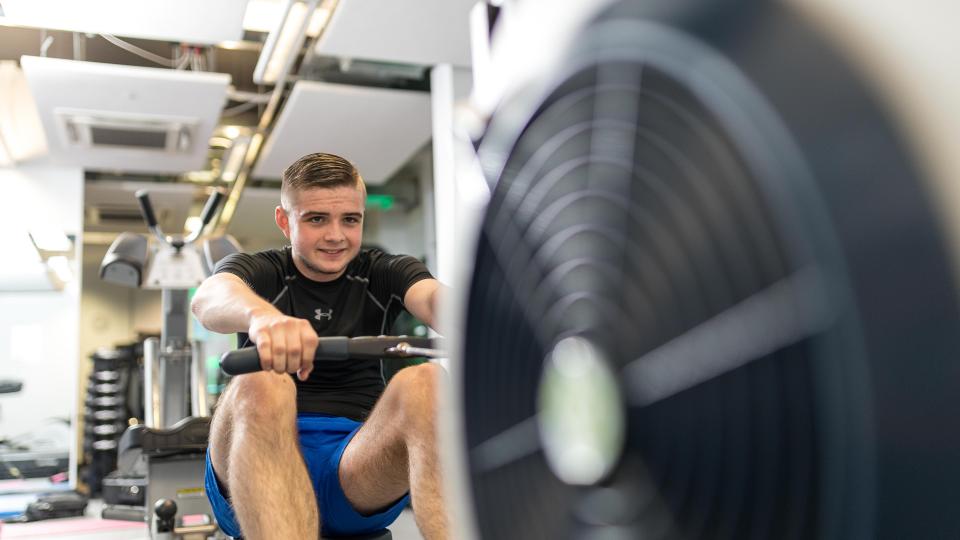
Looking after your wellbeing
Introduction
The final year of a degree can be a challenging time and it is important you take time to look after yourself.
Practising wellbeing techniques can help you focus and sustain a healthy mind and body. This page provides ideas for time management, managing stress and nerves, tips to unwind, and where to go for support.
Main body
Managing your time
You may be trying to balance your academic studies, career planning, part-time work, family commitments, socialising, and making time to relax. There are not enough hours in the day but learning time management techniques help us throughout our lives.
The NHS and LinkedIn Learning provide some excellent suggestions for time management.
-
Top 6 techniques to improve your time management
1. Make a weekly/daily priority list
We often try to compensate by expecting to do too much in our day. Set realistic goals for each week, and every morning remind yourself what you want to achieve that day. This way you will be able to focus on one task at a time, monitor your work, and feel accomplished at the end of the day.
2. Turn off technology
Phones are great but they are the most common cause of procrastination. Put your phone on airplane mode for 20 minutes, then give yourself 5 mins of ‘phone time’, and continually repeat the pattern. This enables your brain to function at capacity but also means you don’t risk missing out.
3. Set a routine
You may feel the urge to keep working through the night and ignore your body. But setting a daily bedtime and an alarm clock will ensure you get quality rest. A good sleep schedule can affect your mental stamina, performance, well-being and energy level.
4. Take a break
Working 10 hours and only stopping to get a drink will not enhance your cognitive ability. Scheduling breaks will provide motivation and reset your mental state, including time to exercise, do activities, have lunch, go for a walk, or just sit on the sofa.
5. Focus on your diet
Ensure you eat and drink a balanced diet, avoid too much sugary food and caffeine as they can reduce cognitive thinking and make you tired. Protein, water, and key nutrients will support mental stamina and provide higher levels of focus.
6. Socialise
There is nothing worse than saying no to social activities but then spending all your time wishing you were there and not getting much work done. We need to laugh and chat with friends to feel happy and to motivate us.
Coping with nerves and stress - main body
Coping with nerves and stress
You may have already experienced nerves and stress over the last few years, and unfortunately, it is something that continues throughout your career journey.
Sometimes stress stops us from doing work and encourages us to procrastinate. However, it can also be a powerful motivator and we come out the other side proud of our accomplishments. Learning how to manage these feelings can be challenging, and everyone has their own stress management technique, which may also change throughout your life.
-
Practical ways to manage stress
Find which of these help you and share your ideas with friends.
1. Exercise
Exercise reduces levels of stress in our body, improves sleep, and improves our self-esteem. Do what makes you feel good, whether that’s sweating it out in spin, relaxing in yoga, running a half marathon, lifting weights, or taking a walk.
2. Breathing meditation
Focusing on your breathing can help reduce negative emotions and calm you down, The NHS has some tips to help you control your breathing and links to useful videos.
3. Balance your diet
It is easy to reach for caffeine or snacks when we are working hard. Try to limit caffeine and alcohol intake and take a balanced diet to help you stay alert and focused. BBC Good Food has lots of recipes and tips.
4. Write
When you are trying to balance all your commitments it can be easy to overthink or find it hard to focus. Writing our thoughts down can help us reflect on our emotions, recognise achievements, and organise our thoughts.
5. Chat to others
When we have a lot of work it is easy to isolate. Ensure you make time to laugh and have fun with friends and family. It is also important to open up and share your feelings with friends, family, classmates, and staff. You will likely find that everyone has experienced the same feelings.
6. Time manage
Time management can be challenging, check out the section in the guide above to learn how to work effectively and balance your commitments.
7. Organise your environment
Clutter and mess create more stress, by taking control of the environment you will feel more relaxed, and your body will release positive energy.
If you find it hard to manage stress and it continues to persist, it is important to recognise when you need more support. If your stress is causing physical pain, is constant, or it is something worrying you, please talk to your doctor and our welfare support team.
5 top tips to unwind - main body
5 top tips to unwind
Relaxation keeps our minds and body healthier, however, we often don’t feel we deserve it, or we think there is no time due to our workloads. It is important to recognise the benefits of taking time for ourselves and find ways that work for us.
-
Here are our top 5 tips to unwind
1. Lift your heart rate
You may find that you feel exhausted and burnt out. Getting the blood flowing can reinvigorate your mind and body. Take a stroll, stretch it out, lift weights, or sweat it out - just keep moving.
2. Zen out
There is a range of mindfulness techniques and videos that you can use, and it is important to find one that works for you. Mindfulness can help you escape for a short time and learn to control your emotions
3. Flex your creative muscles
You may not see yourself as an artist but doing creative tasks can shake off the stress. You could write your feelings down, listen to your favourite playlist, dance around your room, or do some colouring.
4. Have a laugh
Nothing busts a bad mood and stress as well as the giggles. Talk out your feelings with someone you trust and make time to laugh with friends.
5. Treat your body
We take our bodies for granted and heavy workloads take their toll so let's make time to pamper ourselves. Massage your hands and scalp, roll a ball under your feet, squeeze a stress ball, take a bath, and apply a face mask.
Get support
We understand that your final year can be challenging, so we want you to get the support you need.
-
Student Services
Check out some of our support services and book a 1-1 via the Student Hub. You can also email studentservices@uwl.ac.uk or call 020 8231 2345.
These are just some of the areas we can help:
- Financial Advice
- Immigration
- Personal and Emotional Problems
- Care Experience
- Disability and Learning Disability
- Mental Health
- Counselling
- Health Advice
-
Students' Union
UWLSU offers a drop-in service and an opportunity to book appointments with the SU advice team. They can support you with academic appeals, complains, extensions, feedback, personal support, victim support, and much more.
- To look at what UWLSU can do for you and how to get in touch, please visit the UWL Support webpage.
-
Academic support
Study support
It is common to feel nervous or under pressure when completing assignments. That’s why the study support team are available to assist you. They can help with general academic queries, support your academic journey, and provide feedback. Study support offers 1-1 appointment and workshops that you can book on via the Student Hub.
Visit our Study support for more information
Library subject specialist
Each UWL course has a subject specialist who can assist with specific queries and help you with the relevant academic resources.
- Get in touch with your subject specialist via the Library Staff webpage.
-
Career support
You will be thinking about the next step in your career journey. Therefore, the careers and volunteering team are on hand to help. They can assist with careers, placements, job searching, volunteering, writing CVs, and much more.
- Book an appointment, attend a workshop, and look at the resources they offer through the Student Hub.
-
IT services
Technology is not always easy and sometimes things break, preventing you from working or losing all your hard work. You can get in touch with IT through itservicedesk@uwl.ac.uk or call 0300 111 4895.
To prevent losing any work, always use backups:
- Always have at least three copies of everything important
- Always use at least two different backup methods- USB dick, OneDrive, Desktop, Email.
- Keep one backup copy away from other copies, don’t forget to also make use of the free UWL OneDrive.
- Visit our IT support page for more information
-
Togetherall
The university offers free access to Togetherall - a service that provides resources and a safe platform that offers 24/7 anonymous online support.
- Sign up to Togetherall using your UWL email address for support from our community.
-
Report and support
UWL is committed to making you feel safe and providing a supportive environment.
Our online Report and Support tool enables anyone to report concerns anonymously and receive support from an adviser – Report and Support.




